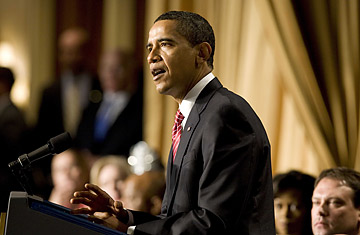
President Obama speaks at the National Prayer Breakfast in Washington
At a time when the White House faith-based-initiatives office created by George W. Bush has precious few supporters on the left or right, President Barack Obama is following through with his campaign pledge to expand its scope and influence within his Administration. Obama made that clear Thursday morning at the National Prayer Breakfast, announcing a new Presidential Advisory Council on Faith-Based and Neighborhood Partnerships that will weigh in on matters ranging from funding of social-service providers and poverty alleviation to the more controversial issue of abortion reduction. "The goal of this office will not be to favor one religious group over another — or even religious groups over secular groups," Obama said. "It will simply be to work on behalf of those organizations that want to work on behalf of our communities, and to do so without blurring the line that our founders wisely drew between church and state."
The council will be made up of 25 secular and religious leaders from across the spectrum of faith traditions and ideological backgrounds, including some who did not support Obama's candidacy. A number of high-profile Evangelical leaders are on the roster, including Joel Hunter, a megachurch pastor in the Orlando, Fla., area; Jim Wallis, founder of the progressive Sojourners magazine; and Frank Page, the most recent past president of the Southern Baptist Convention. In addition, several members come from the secular nonprofit world, a community that had limited involvement with Bush's faith-based initiative. (See pictures of Barack Obama's nation of hope.)
The council will work closely with the White House faith-based-initiatives office under the leadership of newly appointed director Joshua DuBois. The 26-year-old DuBois spearheaded religious outreach for Obama's presidential campaign and has been one of the President's closest advisers on religion. While in college, DuBois became an assistant pastor at a small Pentecostal church in Boston, and he helped make Obama's religious outreach the most extensive and comprehensive yet for a Democratic presidential campaign. He has also been behind some moves that have raised eyebrows, including Obama's participation in last summer's Presidential Forum at Rick Warren's Saddleback Church and, more recently, the selection of the Evangelical author and pastor to deliver the invocation at the Inauguration.
In the White House organizational chart, both the faith-based-initiatives office and the advisory council will fall under the purview of the Domestic Policy Council. That decision represents a significant shift from the Bush Administration, in which the religious-liaison operation was focused more on outreach than on policy generation and its stated mission was relatively simple: to expand the opportunities for faith-based and other community organizations to compete for federal funds. The faith-based discussion largely centered on the question of who provided social services, and Bush himself weighed in on the side of arguing that faith-based organizations could often provide more effective help than their secular counterparts. (See pictures of Barack Obama taken by everyday Americans.)
Obama rejected that approach forcefully in a campaign speech last July in Zanesville, Ohio, during which he laid out his plans for a revamped faith-based effort. "We need all hands on deck," Obama said, declaring that the problem during the Bush years wasn't that the right or wrong organizations were applying for grants but that federal funds for social services had dwindled considerably. With today's announcement and the establishment of the council, Obama has also made clear that he intends to involve the religious community in issues beyond federal funding, including more traditional concerns like religious liberty. (See pictures of Barack Obama behind the scenes on Inauguration Day.)
It is an ambitious task down a path studded with political mines. Although partnerships between faith-based organizations and government have existed for decades and were reinvigorated during the Clinton Administration, the issue became a partisan football during Bush's time in office. Even some of the faith-based initiative's earliest supporters — including Republican Congressman Mark Souder of Indiana and former office director John DiIulio — strongly criticized the way the Bush White House handled the effort and cut funds for social services. "The Bush Administration pushed hard on the things that created the most controversy and made it look more controversial than it is," says Melissa Rogers, professor at Wake Forest University's divinity and law schools.
One of those controversial points was the question of whether faith-based groups that receive government funding should be allowed to hire only individuals who share their religious beliefs. Early in Bush's first term, he signed a series of Executive Orders exempting religious organizations from nondiscrimination laws.
